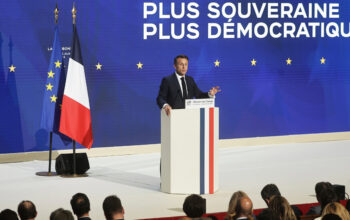
Russia turned down the temperature on another potential provocation in Western Europe on Saturday, backing out of a plan to conduct naval exercises next week in international waters off Ireland’s coast, which had drawn protests from Irish fishing groups and the Irish government.
The naval drills were set to take place 150 miles off Ireland’s southwest coast — outside its territorial waters but within Ireland’s exclusive economic zone, an area where the country has sovereign rights over marine resources.
Fishing groups raised concerns that the activity could disrupt marine life and jeopardize an important region for their trade. One organization had planned to peacefully protest the exercises.
Ireland’s foreign minister, Simon Coveney, described the proposed drills in an interview last week with the Irish public broadcaster RTE as “simply not welcome and not wanted right now.”
While acknowledging that Russia’s plans did not breach the international law of the sea, he said in a statement that his department had raised several concerns with the Russian authorities “in light of the current political and security environment in Europe.”
Moscow then decided to move the exercises outside the Irish exclusive economic zone “as a gesture of good will,” the Russian ambassador to Ireland, Yuriy Filatov, said in a statement released on Saturday. Mr. Coveney said on Twitter that he welcomed Russia’s response.
The U.S. military has noted signs that Russia and its proxies are stirring up discord and confusion far from Ukraine to distract the United States and its European partners.
Russian surveillance aircraft last week flew near Al Tanf, a military outpost in Syria near the Jordanian border where some 200 American troops are training allied Syrian militia members. Two Russian warships are in the Red Sea waiting to steam into the eastern Mediterranean, where an American aircraft carrier is conducting a naval exercise.
In West Africa’s Sahel region, supporters of a military coup in Burkina Faso took to the streets this week waving Russian flags, showing their desire to pivot away from France, the former colonial power, and toward Moscow.
French officials suggested that the Russian Embassy may have paid the supporters to wave flags, as the Russians have done in Mali, a country north of Burkina Faso that recently signed a deal to bring in several hundred Russian mercenaries to help combat a growing Islamist insurgency there. France and several other European countries operating in Mali have strenuously opposed the country’s plan to recruit mercenaries from the Wagner Group, a Kremlin-linked firm.



